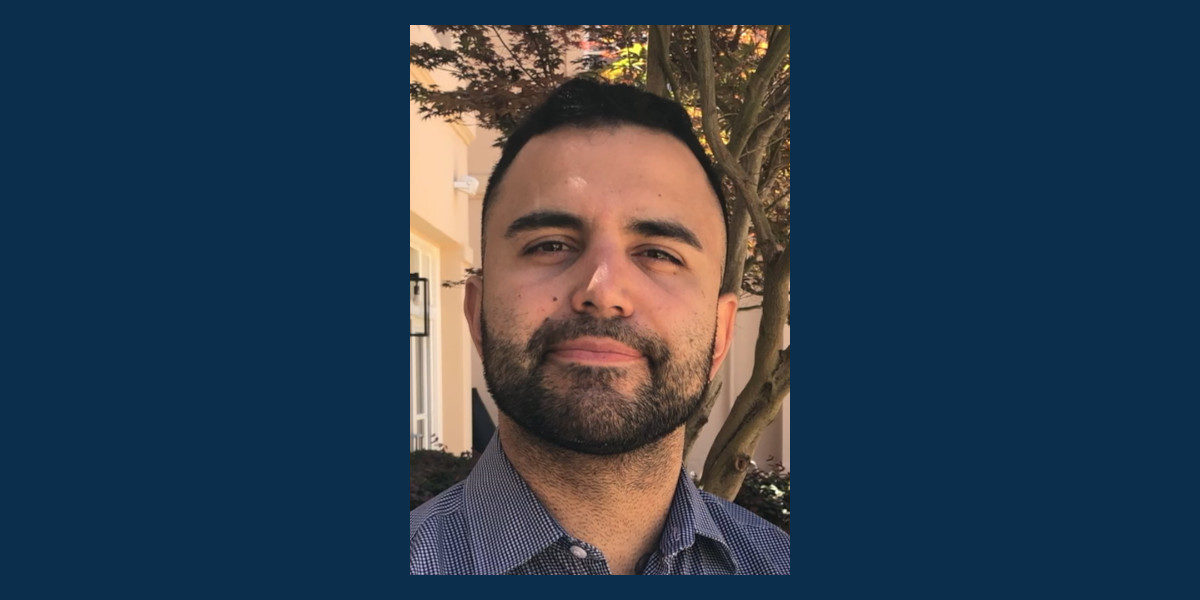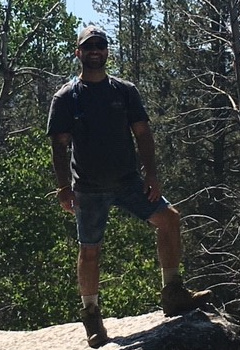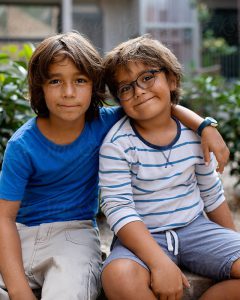

Mental Health Talent Pipeline Spotlight: Catching Up with Luigi Valencia
Luigi Valencia was the first participant in our Mental Health Talent Pipeline project. Read about his remarkable work here.
In 2018, Luigi Valencia was a graduate student in counseling psychology at USF Santa Rosa. That year he also became the first scholarship recipient in the Healthcare Foundation’s then-new Mental Health Talent Pipeline pilot project. That support contributed to Luigi’s completion of his master’s degree as he joined SOS Community Counseling first as a student trainee and then as an associate counselor working in their youth diversion program.
Today, Luigi is the director of SOS’s Justice Programs for youth. He has also pursued his commitment to public service by becoming a Santa Rosa police officer. We were elated to have Luigi join us earlier this month at the Wetzel Awards ceremony, and are pleased to share the following recent conversation in which we catch up with the remarkable work he has been doing since becoming an MFT and our very first Mental Health Talent Pipeline scholar.
Can you tell us what initially brought you to the program at USF?
I had just finished my undergrad at Sacramento State in clinical psychology. I knew I wanted to pursue this as a career, but I also needed to work full-time in order to survive. Something that drew me to the graduate program at USF was the fact that they only held classes one day a week, with the occasional Saturday. I thought, yeah, that’s doable. It was in Santa Rosa, too, which was even better, because that was where I lived and where I’m from. So I applied and got in.
Your final year entailed a traineeship at SOS Community Services, where you ended up working after graduating.
Yes, I applied to different agencies but ended up staying with SOS for the simple fact that it meant working with youth in particular. I’ve always been drawn to that. I started up with SOS in my traineeship year and I’ve been here ever since, I love it.
How has your role there developed?
I’ve since taken on a bigger role. [Back in 2018] I was doing youth diversion services, mainly in Healdsburg. Since then, I’ve taken on responsibility for all the justice programs. That entails the entire districts of Windsor, Healdsburg, and Cloverdale. I oversee those programs and their staffs. I also still work in Healdsburg [as a therapist] through citation-based referrals.
“Instead of ostracizing the youth, we bring them back to the group. I’m a firm believer that we heal in community.”
Luigi Valencia, Mental Health Talent Pipeline Alumnus
What is the nature of the justice programs you oversee?
They’re focused on the restorative process for youth. A lot of the time these kids are either being suspended, being cited, or undergoing some other type of punitive measure. Our mission is to offer therapy in lieu of those punishments. We give them an opportunity to address whatever underlying issues are leading to their behavior. Nine out of ten times the kids don’t know why they’re even doing what they’re doing. So we’re bringing awareness to their pain and to their behavior via therapy, community service, and active restitution—because we want them to also restore their standing in the community and with those they have offended, whether it was a teacher, another student, or a store they stole from. Offering support through structure and therapy, that’s what our justice program does in a nutshell. And that’s what my mission is as a person, what I like to do.
Did the program exist prior to your joining SOS?
It did but not to this extent. Before, it was strictly citation-based. As we know, a kid being cited presents an urgent situation, but there are a lot of other kids out there who are falling through the cracks. Just because they’re not being cited doesn’t mean that they don’t have things going on where they could use some extra support. We wanted to cast a wider net, to reach as many youth as we possibly can, and in my honest opinion every human being can benefit from therapy. We’ve now incorporated working with school districts. If a kid has truancy issues or gets any kind of suspension, detention, anything punitive, we can offer this program and therapy as a way out of the behaviors—so they can be a better student and feel better overall as a human being.
How receptive are the youth to the idea of therapy as something that might benefit them?
There’s no simple answer to that question because depending on what population you’re working with you’re going to get a different response. I work in northern Sonoma County, so a lot of the people we’re interacting with come from a migrant worker background or another low-income social-economic status. Culturally, therapy is often taboo. I find that, when I’m meeting with the child and their parents in the first session and I’m explaining what therapy is offering, the response is often dismissive. They see it as an opportunity for their kid to have this citation removed from their name. As far as therapy goes, the parents don’t really grasp what it is. Historically, in the Latinx culture, we don’t talk about feelings.
Do you think there’s been any change in that respect?

Yes, and it’s great to see some slow change in that situation. What I do see is that the kids at first are very noncommittal, very withdrawn, very “I don’t want to do this.” By the end, however, they are super thankful. When I’m walking around campus, kids that I worked with two or three years ago will come up to me and greet me with, “Hey, man, how you doing?” These are kids who would normally never say hi to anyone. It’s tangible; you can feel the energy when they come up to you. These are students who are now getting A’s and B’s and C’s when before they weren’t able to complete the class. It all comes from simply offering a space for a kid to be themselves. I’m on the journey with them but they’re the captain. All I’m doing is turning over stones and asking, what’s this? Or, what about this?
The approach, then, is about strengthening ties with the community as opposed to removing young people from the community.
Right. Instead of ostracizing the youth, we bring them back to the group. I’m a firm believer that we heal in community. That’s how I was raised. We heal together. When we are isolated, that’s when we get even further apart—apart from ourselves, apart from our tribe, apart from our community. That’s why I bring in other resources, like community members who want to offer volunteer work for these young people, to help show them that the world is bigger than just their apartment complex or their housing project.
You’re also working as a police officer now. How does that relate to the work that you do as a counselor and therapist?
I think it gives me perspective. I see what happens with an issue when it does get addressed, and then what happens when it’s not addressed and the behaviors that come with that. Quite frankly, I feel like I’m offering therapy on the streets [as a police officer] when I’m interacting with people. I’m showing them compassion, showing them empathy, and treating people like the human beings that they are. I ask, “Is there another way we can go about this? Who can I call right now to get you services instead of taking you to jail?” That’s been my approach, and I think generally speaking the officers in my department take that approach as well. That starts with our leadership, wanting to be less punitive and more restorative. They’re now offering diversion service through the department, which is great. Overall, I think that we’re heading in the right direction with mental health. I’m offering mental health training and de-escalation training in the department, which is great.
Are coordination and partnerships with other agencies a big part of the picture?
I can’t do any of this work without the support that I receive from the community—the members of my agency, my police department, city council members, members of the school districts, everyone. We’re all in this together. We’re all trying to make a change. Success has come from community members working together, and the different agencies that are willing to put in the work, to stick their hand out for these kids. It’s just been paramount.

Related News + Stories
Invest in Our Community
Your support is vital to our collective vision of eliminating health inequities in northern Sonoma County.
Donate



